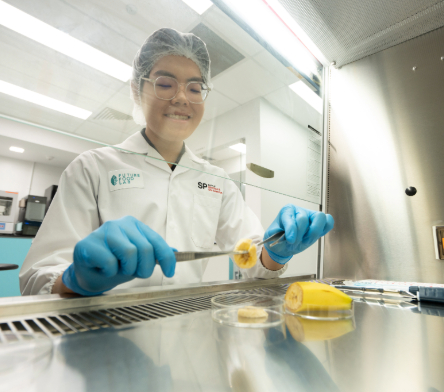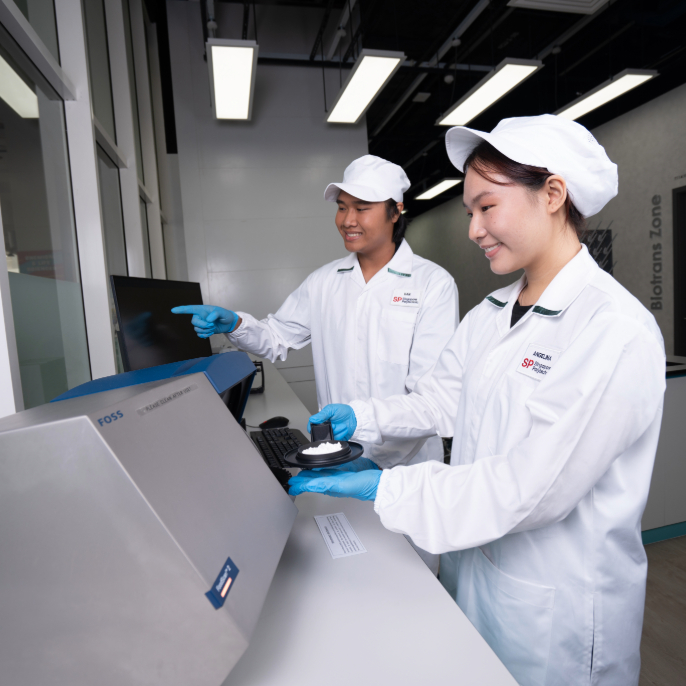If you're intrigued by the science behind every delicious bite, ensuring food safety, and blending flavour with innovation, this interdisciplinary field is for you. You'll apply scientific principles to the study of food, exploring its chemistry, biology, microbiology, and engineering. In modern labs, you'll solve problems and develop new formulations and processes. Start your food science journey with SP today.
In addition, you will graduate with a Minor upon the completion of a suite of related elective modules. SP offers 6 Minors for you to choose from:
Please note: Course structure is subject to change.
Electives
The SP elective framework offers students options to pursue their passion and/or meet different career needs, and is an integral part of the holistic education we seek to provide to our students.
Learn about SP Elective Framework
The Common Core Curriculum (CCC) prepares you for a changing world with essential human and digital skills. Through its 10 modules, the CCC also provides a wide learning experience to examine local and global issues based on the Sustainable Development Goals (SDGs). These modules help you understand real-world issues and the impact on different communities, and equip you with skills to create a better, sustainable Singapore and world.
Learn about Common Core Curriculum

What are the eligibility requirements for food science and technology?
You must meet the following criteria to qualify for the Diploma in Food Science and Technology:
If you’re drawn to experimentation, logical thinking, attention to detail, and solving complex problems, the food science and technology course is for you. Ideal for curious minds with a flair for Chemistry and Biology, this diploma equips you with the skills and knowledge to innovate and impact the food industry.
SP offers many scholarships to recognise talent and service, from Year 0 to after graduation. These scholarships provide tuition fee waivers and chances to represent SP. They are awarded for academic excellence, contributions to arts or sports, and community service. Edusave awards and external sponsorships are also available.

Food science and technology at SP prepares me for the future.
The Future Food Innovation District Ecosystem (FFID) serves as an innovation hub for the food industry, connecting students with industry partners for direct mentorship. These cutting-edge facilities immerse students in real-world settings, where they learn to tackle product development challenges, preparing them to solve real-world food problems effectively.
Food science and technology at SP prepares me for Singapore.
Singapore's food science and technology sector offers key opportunities in food processing, manufacturing, and safety. Local companies and research centres are driving innovations, improving health-focused food formulas, and adapting products to local tastes, with potential for global impact. This industry is crucial for enhancing food security and sustaining Singapore's leadership in food technology.
Food science and technology at SP prepares me for the world.
There are many niche fields within food science and technology. At SP, you can explore the following:
Food Chemistry: Understanding the chemical makeup of food, including nutrients, flavours, colours and how they change during processing, storage, and cooking.
Food Microbiology: Studying microorganisms in food, such as bacteria, yeasts and molds and how they affect food safety, spoilage and fermentation.
Food Processing: Developing methods to convert raw ingredients into safe, nutritious and tasty food products. This includes everything from pasteurization and canning to freeze-drying and extrusion.
Food Engineering: Applying engineering principles to food production, such as designing machinery for food processing, packaging and storage.
Food Safety and Quality Control: Ensuring that food products are safe to eat and meet regulatory standards. This involves testing for contaminants, allergens, and ensuring consistent quality.
Nutrition: Studying the nutritional value of foods, including how different processing methods affect nutrients and how food can be designed to meet dietary needs.
Product Development: Creating new food products, from concept to market, often with a focus on improving taste, nutrition and sustainability.
Sensory Science: Analysing how food's appearance, taste, smell and texture affect consumer preferences and behavior.
Each type of field gives you practical skills, preparing you for diverse roles in the food industry.
During their 22-week internship at companies like Nestlé, AVA, Symrise, KH Roberts, A*star and Yakult, students work on product development from ideation to production. They gain international experience by sending products abroad for testing and refining them with global feedback. Many outperform university interns and secure roles like Assistant Quality Assurance Officers after their internships.
A good SP internship offers meaningful work, learning opportunities, and professional growth. You'll gain industry insights, network with professionals, and receive mentorship to enhance your confidence and employability. SP internships often lead to higher starting salaries and informed career decisions, providing a strong foundation for your future.
Overseas exposure helps broaden your horizons. Understanding globalisation and working with diverse cultures is important in a global city like Singapore. Food science and technology students and alumni have experienced international internships and exchanges, enriching their worldviews and career prospects. Students in other CCAs also have opportunities to represent Singapore abroad and gain international experience.
We know some of you want to challenge yourselves more. Stepping out of your comfort zone is important.
SP students have participated in competitions like the World Skills Competition, the Nestlé Young Culinary Talent (YOCUTA) Programme, and the Singapore Food Expo Competition.
Winning these awards tests your knowledge and builds confidence. Knowing where you stand helps you grow and stay competitive.
SP food science and technology graduates often further their education in specialised or complementary fields. They have pursued degrees like Bachelor of Science (Food Science and Technology), Chemistry and Biological Chemistry with a Second Major in Food Science & Technology, and Food Technology (Honours).
Common degrees include:
For a comprehensive list of degree options and advanced standings, visit the Advanced Standing Database.
If you’re preparing for university and want to make the most of your diploma time, an SP diploma can let you fast-track your education by 0.5-2 years!

What I like most about SP DFST is the holistic approach which has prepared me to be future-ready. My dedicated lecturers have ignited my curiosity for food science by engaging in meaningful project discussions coupled with a plethora of well-designed practical sessions. Its well-curated curriculum recognises that every student learns in a different way and at a different pace. I had a very fulfilling journey in SP DFST, and it has further fuelled my passion for food science and technology!

During my time in SP, I gained a deeper understanding of the science behind the journey from farm to fork. What sets the DFST course apart is that it not only provides academic knowledge, but also practical experience through real-world commercial projects. This has been extremely beneficial in preparing me for the workforce. I can confidently say that my experience has been incredibly rewarding, and it has only strengthened my passion for food science.

.jpg?Status=Master&sfvrsn=7cf6c156_3)